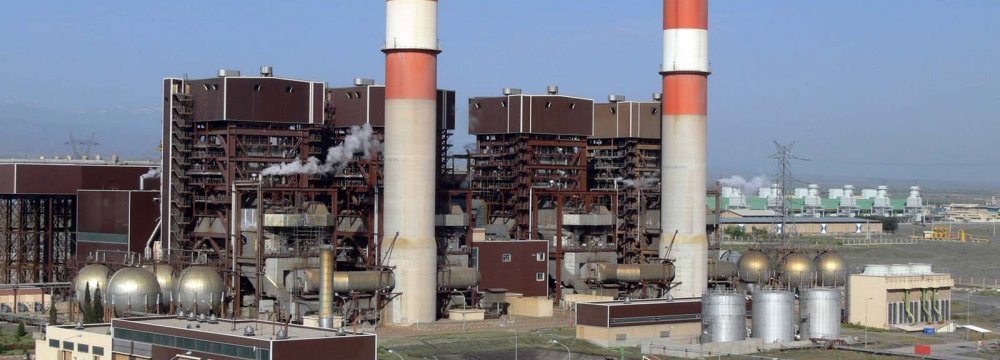
Private Sector Eyes Water, Power Projects Worth €10b

"Iran's private sector is in negotiations with private international companies over €10 billion ($11.8 billion) worth of investments across the water and electricity industries," Sattar Mahmoudi was also quoted as saying by IRNA on Monday.
He made the statement in the opening ceremony of the International Water and Wastewater Exhibition in Tehran, a four-day event that will host 258 domestic firms and 105 companies from 20 countries through Thursday.
According to government officials, Iran has signed deals of nearly the same value to expand or renovate electrical infrastructure since last year's lifting of international sanctions over Tehran's nuclear dispute.
Mahmoudi said foreign companies see Iran as an increasingly attractive market, stressing that the ground is prepared for a new wave of investment in the key water and power sectors.
"We see a healthy competition this year on transferring technologies and securing deals between the Iranian and foreign private sectors … Some countries have further signaled their interest by participating in groups," the official said, pointing to Germany, China and Turkey who have national pavilions.
Mahmoudi has temporarily taken over one of the only two Iranian ministries that remain without a minister since President Hassan Rouhani presented his Cabinet to the parliament in August. However, he indicated that development plans in water and power industries have not been affected by the lingering transition in the ministry.
"Negotiations are in place over [building] new power stations with a total production capacity of 8,000 megawatts. Moreover, 2,000 MW of new capacity will be financed by the National Development Fund of Iran," he said.
New projects at home come as Iranian firms aim to play a more active role in regional power projects. MAPNA Group, Iran's largest power plant contractor, is developing a 3,000-MW power plant in the southern Iraqi city of Basra following a $2.5 billion contract it signed in 2015.
A landmark renewable power deal with a British company last month shows the wheels are turning in Iran's power sector.
In September, London-based renewable energy investor Quercus signed a $600-million deal to build a 600-MW solar power project in central Iran, the biggest renewable contract yet in the oil- and gas-rich nation and one of the world's largest solar farms.
The Energy Ministry has said that nearly 3,000 water and wastewater projects nationwide are incomplete due to a lack of funds.
Iran is located in one of the most water-stressed regions in the world. Average annual rainfall is around 250 millimeters per year, or almost one-fourth of average global precipitation. That is compounded by excessive and seemingly unrestrained consumption of the dwindling resource.
Besides efforts to foster a better consumption pattern, the situation has prompted officials and stakeholders to launch infrastructure projects, such as modernizing the aging water supply network, a major source of leakage, and building new water desalination units.


Trump weighs using $2 billion in CHIPS Act funding for critical minerals

Codelco cuts 2025 copper forecast after El Teniente mine collapse

Electra converts debt, launches $30M raise to jumpstart stalled cobalt refinery

Barrick’s Reko Diq in line for $410M ADB backing

Abcourt readies Sleeping Giant mill to pour first gold since 2014

Nevada army depot to serve as base for first US strategic minerals stockpile

SQM boosts lithium supply plans as prices flick higher

Viridis unveils 200Mt initial reserve for Brazil rare earth project

Tailings could meet much of US critical mineral demand – study

Kyrgyzstan kicks off underground gold mining at Kumtor

Kyrgyzstan kicks off underground gold mining at Kumtor

KoBold Metals granted lithium exploration rights in Congo

Freeport Indonesia to wrap up Gresik plant repairs by early September

Energy Fuels soars on Vulcan Elements partnership

Northern Dynasty sticks to proposal in battle to lift Pebble mine veto

Giustra-backed mining firm teams up with informal miners in Colombia

Critical Metals signs agreement to supply rare earth to US government-funded facility

China extends rare earth controls to imported material

Galan Lithium proceeds with $13M financing for Argentina project

Kyrgyzstan kicks off underground gold mining at Kumtor

Freeport Indonesia to wrap up Gresik plant repairs by early September

Energy Fuels soars on Vulcan Elements partnership

Northern Dynasty sticks to proposal in battle to lift Pebble mine veto

Giustra-backed mining firm teams up with informal miners in Colombia

Critical Metals signs agreement to supply rare earth to US government-funded facility

China extends rare earth controls to imported material

Galan Lithium proceeds with $13M financing for Argentina project

Silver price touches $39 as market weighs rate cut outlook

















